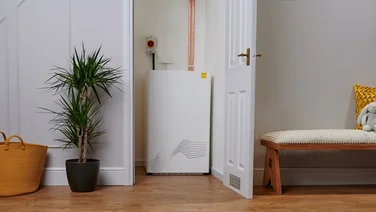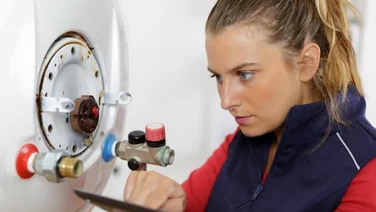We receive a small fee from trusted installers when you request a quote through our site. This helps us keep our content independent, well-researched and up to date – Learn more
✔ The government wants 80% fewer gas boiler installations by 2035
✔ Electricity and alternative heating methods will become cheaper
✔ A heat pump is a viable heating solution for most UK homes
The UK government announced a ban on gas boilers – then watered it down to an 80% reduction by 2035. If you’re looking to replace your gas boiler, check out our page on new boiler costs.
Given the global gas shortage that’s causing a number of energy firms to go bust, a gas boiler phaseout can’t happen quickly enough.
Here’s everything you need to know about the gas boiler phaseout, including when, why, and how it’s happening, who it’ll affect, and which alternatives are best for you.
You can also get ahead of the game by looking at different boiler options – which is where we come in. To receive free boiler quotes, all you have to do is pop a few details in our easy-to-use tool, and we’ll put you in touch with experts in the area. This way, you’ll find the best deal for your property.

When are gas boilers being phased out?
Gas boilers are being phased out now to meet the government’s aim of reducing installations in domestic properties by 80% by 2035.
Unlike the government’s previous goal of banning gas boilers entirely, this target will not stop anyone from buying a new gas boiler at any point.
The new target, which Labour has said it will preserve if it wins the next general election, will instead require the government and manufacturers to convince most of the public that gas boilers are no long the best option.
The Boiler Upgrade Scheme, which now offers lump sum grants of £7,500 towards the cost of a new heat pump, is a major part of this ongoing campaign.
Why is the government phasing gas boilers?
The government is phasing out gas boilers to combat climate change – and specifically to fulfil its legal obligation to reach net zero by 2050.
14% of UK greenhouse gas emissions come from domestic energy use, according to the most recent government report, and a large part of this is down to gas boilers.
Phasing them out is therefore a crucial part of hitting net zero.
Other heating methods are also more efficient than gas boilers – for instance, heat pump efficiency levels are usually three times higher than gas boilers – so this shift should also lower domestic energy bills across the country.
We just need to make it affordable for the great majority of homes to switch over to a new heating system, and lower the price of electricity by building more renewable power plants.

How will you be affected by the gas boiler phaseout?
The policies accompanying the gas boiler phaseout will theoretically make alternative heating options more financially attractive in the coming years.
If you’re a homeowner, this means you should avoid automatically getting a new gas boiler when your current one gives up the ghost.
Instead, consider all the options we’ve laid out lower down, with a particularly focus on heat pumps, which are likely to eventually become the most popular heating system in the UK.
If you move home, there’s an increasingly high chance your new property will be heated renewably, which is future-proof and will soon be cheaper than gas.
Renters will also benefit from this shift away from gas, as the declining cost of electricity should lower everyone’s energy bills.
Want to find out more about our gas-free future? Check out our page, How And When Will The UK Stop Using Gas?
Will you have to stop using your gas boiler?
You won’t have to stop using your gas boiler at any point.
No-one will be forced to remove their existing gas boiler or replace a broken one with an alternative heating system.
However, you may well want to.
The government must stimulate the heating industry and lower consumer costs in order to make its 80% phaseout target a reality, and these changes should help create cheaper, more efficient non-gas systems.
What are the alternatives to gas boilers?
Although this transition to different heating systems might sound intimidating, over the next few years, low-carbon heating methods will become more common – and hopefully more affordable – for homeowners.
In its Heat and Buildings Strategy, the government is keen to point out that “the move to low-carbon heating will be a gradual transition, from niche product to mainstream consumer option.”
Below, we’ve listed some of the more promising alternatives to gas boilers for UK homeowners.
Heat pumps
Heat pumps are typically three times more efficient than gas boilers, popular in many European countries, and ready to the primary heating method of UK homes.
There are four main types of heat pumps: air, ground, air-to-air, and water source.
Air source heat pumps extract warmth from the air outside, heat it further, and use it to power your home’s heating and hot water systems, whilst ground source pumps absorb geothermal heat from the ground.
Water source heat pumps take warmth from bodies of water like lakes, rivers, and streams, and are usually more efficient than other heat pumps – but you need to have a source of water on your property.
Air-to-air heat pumps work like air source heat pumps, except they don’t interact with your hot water supply. Instead, they simply blow hot air into your home – or cold air, during hotter months.
Heat pumps run on electricity, so they’re much better for the climate than gas or oil boilers – which is why the government is encouraging more homes to install them.
Depending on which type of heat pump you go for, the upfront cost for purchase and installation can be anything between £7,000–£49,000. Bear in mind that you can get up to £7,500 off your heat pump by using the Boiler Upgrade Scheme – a government grant for homeowners in England and Wales.
Compared to a gas boiler, air source heat pump costs are higher, but over a heat pump’s lifetime, consumers will typically save £4,891 – not to mention roughly 20 tonnes of CO2 – mainly because they usually live twice as long as gas boilers.
Want to know how a heat pump compares to gas boiler? Check out our helpful guide.
Infrared panels
Infrared panels are pretty new to the UK heating scene, but have a promising future ahead of them.
Unlike gas boilers, infrared systems heat objects directly, rather than warming the air in a room. Panels propped up onto the walls or ceilings channel radiation to specific areas of the property. Although the word ‘radiation’ might trigger warning signals in your mind, rest assured that this heating method is 100% natural and risk free.
An infrared panel system for a three-bedroom house should cost around £6,000, but this can fluctuate since you’ll need at least one panel for each room.
As well as reducing home emissions, infrared heating can lower heating costs by 30-50% – but this will depend on the construction of your home, the property’s ceiling height, and how well insulated it is.
Users should bear in mind that, to fully replace the functionality of a boiler, infrared panels need to be paired with an air-sourced hot water cylinder.
District heat networks
A district heat network does what it says on the tin – it’s an underground network of insulated pipes, which take heat from one source and deliver it to different buildings in a specific area.
While the pipe network itself is usually the same across different systems, the heat sources can vary. There are some facilities that provide a dedicated supply to the heat network, such as a combined heat and power plant, and others that provide heat recovered from industry and urban infrastructure.
A key example of this is Bunhill 2 District Heating Network – a system in North London, which uses unwanted heat from the London Underground to heat homes in Islington.
Hydrogen boilers
Hydrogen boilers are very similar to gas boilers, except they burn cleaner fuel.
A major benefit of hydrogen boilers is that they work in exactly the same way as gas boilers – by burning the hydrogen via combustion – so homeowners shouldn’t take long to adjust to them. Hot flue gases can then be used to heat water and radiators, or they can also be stored for later use.
When it comes to costs, things are a little murky for hydrogen boilers, since they’re still in the prototype stage. However, many manufacturers are confident they won’t cost any more than natural gas boilers.

Fossil fuels vs renewables
So, is the gas boiler phaseout worth celebrating? Although gas isn’t as bad as coal and oil, it’s still one of the fossil fuels that’s stoking the fires of climate change. So yes, this change to home heating is good news.
It’s also evidence that the UK government is finally taking renewables seriously – a long-overdue change in attitudes that’s been inevitable since 2019, when the UK first sourced more electricity from renewables than from fossil fuels.
What does this mean for the UK?
The gas boiler phaseout means shrinking our national carbon footprint, reducing the amount of air pollution, and increasing the chances we hit our goal of net zero by 2050.
To achieve the phaseout, we need more and cheaper electricity, and for that to happen, the country must build more solar farms, wind farms, and other green sources of energy.
If the government’s plan succeeds, nearly everyone will want to replace their gas boiler. Other heating systems will be cheaper to buy and run, so customers will flock to them.
And if the government continues its half-hearted approach to policies that fight climate change, you’ll still be able to buy a gas boiler.
Gas boiler phaseout: what’s the verdict?
We’re stepping into a new era – one where fossil fuels are dying out, and renewables are increasing.
Phasing out gas boilers will not single-handedly rescue us from climate change, but it’s certainly a step in the right direction.
If the gas boiler phaseout hasn’t kicked into gear in your area yet, and you’re still interested in a new gas boiler, you’ve come to the right place.
Our local suppliers can provide you with quotes to compare the best prices – all you have to do is pop a few details in this short form.









